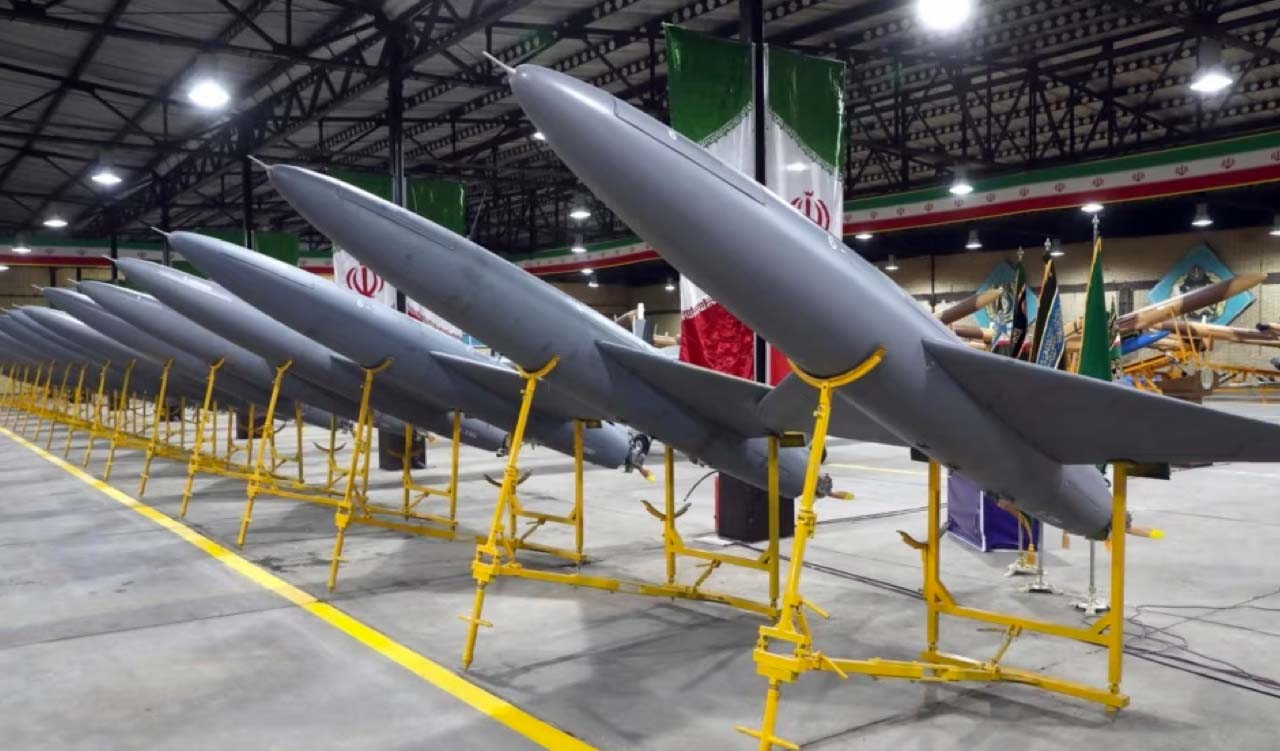US Imposes New Sanctions on Support for Iran’s Drone Program
“Iran’s illicit production and proliferation of its deadly UAVs to its terrorist proxies in the Middle East and to Russia continues to exacerbate tensions and prolong conflicts,” Brian Nelson, Under Secretary of the Treasury for Terrorism and Financial Intelligence, said.

WASHINGTON DC, United States (Kurdistan 24) – The U.S. Treasury Department on Tuesday announced sanctions on four individuals and ten companies involved in an international network to obtain parts for Iran’s drone, or Unmanned Aerial Vehicle (UAV), program.
The sanctioned network secured electronic components through east Asian countries, including Malaysia, Indonesia, and Hong Kong.
The key figure in the procurement network is Hossein Hatefi Ardakani, a 38 year old Iranian, associated with Iran’s Islamic Revolutionary Guard Corps Aerospace Force Self-Sufficiency Jihad Organization (IRGC ASF SSJO), the Treasury Department said.
The network “has facilitated the procurement of U.S. and foreign-origin components worth hundreds of thousands of dollars” for the IRGC-ASF-SSJO, it stated.
Ardakani is chairman of the board of directors of Kavan Electronics, an Iranian-based company, which was among those sanctioned on Tuesday.
In September 2020, Ardakani, along with a Chinese national, Gary Lam, also known as Lin Jinghe, was indicted by the Justice Department for conspiring to illegally export U.S.-made dual-use microelectronics to Iran.
That indictment was unsealed on Tuesday, as the Treasury Department explained that the indictment had been the product of “a multi-year investigation” by the Department of Homeland Security. In the process, Treasury bolstered its case for the sanctions it had imposed.
Iranian Drones Used in Middle East and Russia
“Iran’s illicit production and proliferation of its deadly UAVs to its terrorist proxies in the Middle East and to Russia continues to exacerbate tensions and prolong conflicts,” Brian Nelson, Under Secretary of the Treasury for Terrorism and Financial Intelligence, said in announcing the new sanctions.
Iran’s proxy militias have regularly targeted troops from the anti-ISIS Coalition deployed to bases in Syria and Iraq, including in the Kurdistan Region.
Read More: Pro-Iran Militias Continue Attacks against US Forces in Iraq, Syria, as Biden Administration Criticized for Weak Stance
And Russia has used Iranian drones extensively in its war against Ukraine. Last August, as Britain’s Guardian newspaper reported, the Ukrainian government submitted a lengthy document—nearly 50 pages—to the G-7 group of industrialized democracies: Canada, France, Germany, Italy, Japan, the U.K., and U.S.
The Ukrainian paper explained that during the previous three months, Russia had launched over 600 raids with explosive Iranian drones that contained western technology.
“Among the manufacturers are companies headquartered” in the U.S., Switzerland, the Netherlands, Germany, Canada, Japan, and Poland, the Guardian reported, citing a copy of the Ukrainian document which it had obtained.
Most recently, yet another Iranian proxy—the Houthis in Yemen—has begun attacking the interests of the U.S. and its allies.
The Houthis have been attacking commercial shipping in the Red Sea, threatening that trade, and prompting the U.S. to announce the formation of an international naval force to provide security for commercial ships.
Read More: US Sec Def Announces Coalition to Defend Shipping Against Houthi Attacks
But will this address the problem?
Biden Administration Still Seen as Weak
Amb. John Bolton, who served as National Security Adviser under Donald Trump, says no.
Bolton published an op-ed on Wednesday in The Washington Post strongly critical of the Biden administration’s approach toward confronting the attacks by Iranian proxies on the vital interests of the U.S., its allies, and partners.
These attacks are a coordinated campaign, directed by Iran, as Bolton suggested.
“Only the credulous doubt that Iran’s regional surrogates are acting in concert in the current crisis,” Bolton wrote, but the Biden administration “seems incapable of thinking strategically about U.S. interests in the region, dismaying friends and allies alike.”
Indeed, as Kurdistan 24 has repeatedly reported, the Biden administration was extraordinarily slow to acknowledge Iran’s ties to the militias carrying out the assaults in Iraq and Syria—until Dec. 8, when an unprecedented flurry of attacks targeted the U.S. embassy, as well military bases in Iraq, including the Kurdistan Region, and in northeast Syria, all of which hosted U.S. forces deployed to fight ISIS.
Those assaults, finally, prompted administration officials to identify the attackers as “Iranian-backed” (Pentagon) or “Iranian-aligned” (State Department.)
Read More: U.S. Cites Iran, as Militias Attack Numerous Sites in the Kurdistan Region, Iraq, and Syria
Bolton’s op-ed affirmed that freedom of navigation, which the Houthis now threaten, “has always been a core U.S. security priority.”
With their “persistent attacks” on Red Sea shipping, they “have already spiked maritime insurance rates,” Bolton wrote. “Four of the world’s largest shippers” now “have ‘paused’ entries into the Red Sea,” while “oil giant BP has followed suit.”
“Ships will be sent around Africa,” he continued, “adding costs and delays to a still fragile international supply chain,” and “oil prices are already rising.”
Bolton criticized the administration’s effort to establish the multinational force as a “purely defensive measure.”
Read More: US Sec Def Hosts 45 Parties in Virtual Meeting on Houthi Threats to International Shipping
As such, Bolton wrote, it “will not deter the land-based, mobile Houthis” or the Iranians who provide the weapons for their attacks.
Indeed, as Bolton put it, very clearly and very simply: “Iran is incontrovertibly behind all these escalations, and it needs to receive a strong signal that its behavior is unacceptable.”
That’s what deterrence is about. Your enemy needs to understand that you are prepared to retaliate with such devastating force that he will regret, for a very long time, having provoked you. So it is better not to take such chances.
The tit-for-tat in which the administration has, so far, engaged does not secure deterrence, as Bolton argued. Rather, it leaves the enemy in control. He understands what you will do in response to his attack on you, and he may well be prepared to pay that price.
Thus, as Bolton concluded, “Deterrence is based not on rhetoric but on power and performance.”